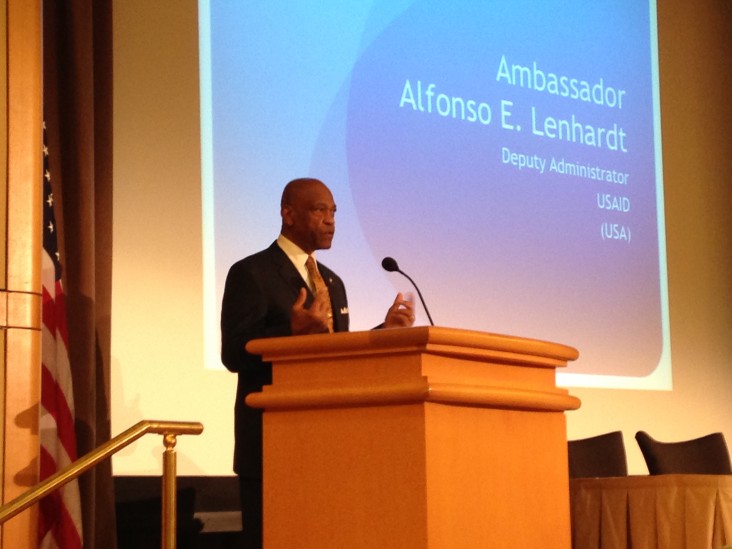
Hello everyone—and welcome back to our Global LGBT Donors Conference.
In particular, I want to thank Todd Larson, our Senior LGBT Coordinator, for his leadership at USAID. I’d also like to thank our State Department colleagues and the Council for Global Equality, for their dedication in putting this event together.
Above all, we are thrilled to be joined here by representatives from so many nations across the globe—demonstrating the diverse international support for LGBT rights.
Our Agency works in more than 70 countries around the world. But no matter where we work, we believe that investing in LGBT persons is a critical part of our mission to end extreme poverty and promote resilient, democratic societies.
Today, we’re pioneering a new model of development that places a greater emphasis on diversity—helping us empower the world’s most vulnerable people.
In doing so, we’re working to ensure that development is inclusive of the partners we work with and the local communities we reach.
Instead of focusing solely on delivering assistance through short-term projects, we’refocused on laying the foundation for sustainable growth.
Key to that effort is protecting—and strengthening—LGBT equal rights around the world.
Because today, there are more than 75 countries that criminalize homosexuality—and in 10 of them, it is punishable by death.
Across the globe, LGBT people are barred from getting an education, seeking jobs, running for office, raising families, and starting businesses.
That’s why—in a groundbreaking Presidential Memorandum—President Obama directed all federal agencies engaged abroad to ensure that the United States promotes and protects the rights of LGBT persons.
Our Agency is working every day to answer the President’s “call to action”—underscoring our enduring commitment to advancing the health, safety, and prosperity of the LGBT community around the world.
I wanted to share with you just a few examples of how we’re doing just that.
This past September, we hosted a landmark event at the UN General Assembly focused on LGBT inclusion in religious communities.
It was the first event in the history of the Assembly to highlight the intersection between religion, cultural attitudes, and extreme poverty.
We were thrilled to see one of my heroes, Archbishop Desmond Tutu, speak at the event. His presence reminded us that—if we hope to make a real, lasting impact—we must broaden the array of partners we bring to this cause.
As Archbishop Tutu said, “We have a responsibility to champion the inclusion of all God's children in society rather than exclusion, bigotry and prejudice.”
At the same time, we are conducting groundbreaking research to not only target hotspots of danger, but discover the most effective ways to turn the tide against entrenched discrimination.
That’s why, this past year, we partnered with UCLA to conduct a groundbreaking study on LGBT discrimination in 39 emerging economies.
The study demonstrated a real—and powerful—connection between LGBT legal rights and economic growth. Today, we’re using its findings to guide our work in fragile communities from Africa, to Asia, to South America.
And finally, we’re harnessing the power of science, technology, and innovation to root out injustice and promote broad-based economic growth.
For instance, in Colombia, we established high-tech laboratories that help the local LGBT community harness cutting-edge technologies.
Through the Labs, activists have already created innovative solutions—like smart-phone applications that help LGBT persons access legal assistance and medical care, all from the safety of their home.
These efforts underscore our Agency’s commitment to ensuring that every citizen, everywhere—no matter who they are or who they love—has access to the same protections, services, and opportunities as anyone else.
But, if we hope to make an enduring impact, wemust continue to find creative ways to reinforce these values in every place we work, and in every program we run.
Because as development professionals, all of our actions and work must reflect the values of democracy, human rights and inclusion.
And, because all of our efforts—from HIV/AIDS programs to humanitarian assistance—are based on the principles of nondiscrimination and equitable access.
It’s now my pleasure to introduce a leader who has demonstrated a commitment to these values and principles throughout his career.
Mr. Erion Veliaj is the Albanian Minister of Social Welfare and Youth. In thisrole, he leads Albania’s efforts to promote gender equality, social inclusion, and a vibrant civil society.
Prior to entering government service, Minister Veliaj founded a leading youth activism organization—for which he won the United Nations Award for civil society.
And even in a country that is such a melting pot of religions and cultures, Minister Veliaj has done extraordinary work to empower all citizens to secure better lives for themselves, and their families.
So once again, thank you for being here. Through our combined efforts, we are opening up new paths to prosperity, energizing the global economy, and reducing root causes of insecurity.
In doing so, we are advancing the values that unite people throughout the world: a belief in the freedom, equality, and the potential of every individual.
Please join me in welcoming Minister Veliaj.
Thank you.
Related Speeches
- Remarks by Veena Reddy, Deputy Mission Director, USAID Cambodia, EPIC Showcase
- Remarks by Makara Ou, Governance and Rule of Law Team Leader Office of Democracy and Governance, USAID Cambodia, Collaborative Workshop
- Remarks by Jean-Marc Gorelick, Acting Director, Office of Democracy and Governance, USAID Cambodia, Collaborative Workshop







Comment
Make a general inquiry or suggest an improvement.